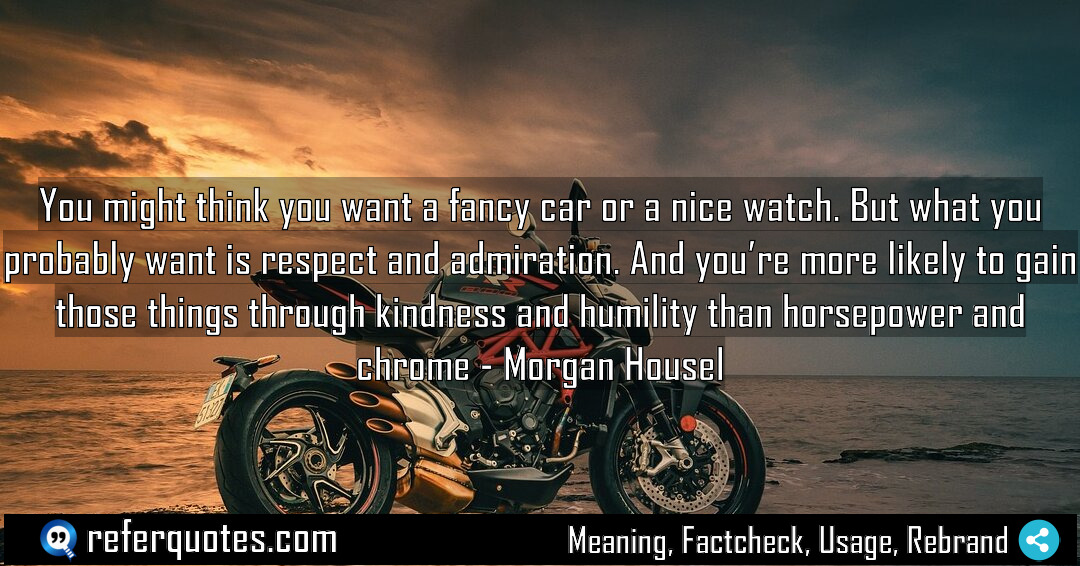
You might think you want a fancy car… but what you’re really chasing is a feeling. Morgan Housel brilliantly reframes our material desires as a deeper, more human need for respect and admiration. It’s a game-changing perspective on true wealth.
Share Image Quote:
Table of Contents
Meaning
This quote isn’t about cars or watches. It’s about the fundamental human truth that we often confuse the symbol of success for the actual substance of it—which is genuine connection and esteem from others.
Explanation
Look, I’ve seen this play out so many times. A colleague buys a luxury car, not because they love the engineering, but because they believe it will project an image of success that commands respect. And here’s the kicker—it might, for a moment. But that kind of admiration is fleeting, it’s superficial. It’s based on what you have, not who you are.
What Housel is getting at, and what I’ve found to be true, is that the respect that actually sticks, the kind that builds your reputation and your network in a meaningful way, comes from your character. It comes from being the person who is genuinely kind, who listens more than they talk, who is humble enough to admit a mistake. That’s the “currency” that compounds over time. Horsepower and chrome depreciate the second you drive them off the lot. But kindness and humility? They appreciate for a lifetime.
Quote Summary
Reading Level55
Aesthetic Score65
Origin & Factcheck
This insight comes straight from Morgan Housel’s fantastic book, The Psychology of Money, which was published in 2020. It’s a modern classic for a reason. You sometimes see this sentiment floating around unattributed on social media, but the specific, elegant phrasing is 100% Housel’s.
Attribution Summary
Where is this quotation located?
| Quotation | You might think you want a fancy car or a nice watch. But what you probably want is respect and admiration. And you’re more likely to gain those things through kindness and humility than horsepower and chrome |
| Book Details | Publication Year: 2020; ISBN-10: 0857197681; ISBN-13: 978-0857197689; Pages: 256 (approx.) |
| Where is it? | Unknown chapter / page |
Context
In the book, this quote sits within a broader discussion about how our financial decisions are rarely just about numbers. They’re driven by our personal history, our ego, and our deep-seated psychological needs. Housel is arguing that if you understand the real need—like the need for admiration—you can make smarter, more fulfilling choices with your money and your life.
Usage Examples
This is one of those concepts you can apply everywhere. Here’s how I think about using it:
- For a young professional: Before you stretch your budget for that premium car loan to impress clients, ask yourself: Will my integrity and competence during a meeting earn more trust than my car in the parking lot? The answer is almost always yes.
- In leadership: A leader who is humble and treats their team with kindness builds a loyalty that a boss with a corner office and a sharp tongue never will. The team’s respect is the real asset.
- Personal finance mindset: It reframes “Why do I want this expensive thing?” into a much more powerful question: “What feeling am I trying to buy?” Often, you can get that feeling for free.
To whom it appeals?
Share This Quote Image & Motivate
Motivation Score60
Popularity Score70
Shareability Score70
FAQ
Question: So, is the quote saying we should never buy nice things?
Answer: Not at all. It’s about understanding your motivation. If you genuinely appreciate the craftsmanship of a fine watch, buy it! But if you’re buying it purely as a status symbol to fill a void of insecurity, that’s a much riskier and less fulfilling path.
Question: But don’t people in the real world respect wealth and flashy symbols?
Answer: They might give it initial attention, sure. But lasting respect? The kind that gets you trusted with bigger projects or builds deep friendships? That’s earned through character. Flash commands attention; character commands respect. There’s a big difference.
Question: How is this a “psychology of money” concept?
Answer: Because it gets to the heart of why we spend. We think we’re making logical financial decisions, but so often, we’re spending to solve an emotional problem. Recognizing that is the first step toward financial and emotional intelligence.
Similar Quotes
Wealth is the nice cars not purchased… it’s a powerful reframing of what true financial freedom really looks like. It’s not about the flashy stuff you own, but the quiet…
You know, I’ve been thinking a lot about “The most valuable asset you can possess…” and it’s true. It’s not your skills or your network, it’s that internal engine. It’s…
You know, that idea of “Owning our worthiness means cultivating the courage…” is really about the daily battle against our own inner critic. It’s not about achieving more, but about…
The most attractive quality in any person is curiosity… because it’s the ultimate social hack. It transforms you from a passive observer into an active, engaging force. It’s not about…
Become the kind of person that people want to buy from. It’s not about a sales pitch, it’s a fundamental shift in who you are and how you operate. This…
